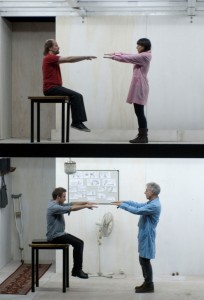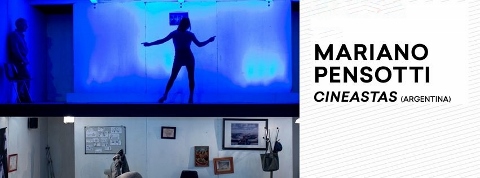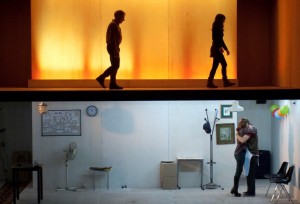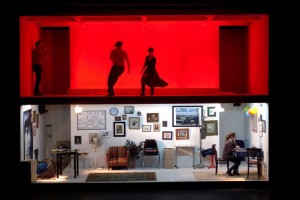SHOW BIZ KIDS
Cineastas at least doubles the self-reflexion of your average REDCAT show. In this new Argentinian play, written and directed by Mariano Pensotti, you watch no fewer than four writer/directors make existential movies, putting themselves into their art and their art into themselves. Hell, that’s more mirrors than a Fellini dolly shot. Maybe making the characters film directors, instead of theater artists like Pensotti, keeps the whole thing from feeling too gauche and obvious. It also very slightly hedges the bet. But the sheer cheek still sets the bar high. If you’re only painting the walls of your studio, you’d better Michelangelo those motherfuckers.
In what I hope is the evening’s most disinterested thread, a successful director finds out he’s dying. He changes the comedy he’s shooting into a banal catalogue of the habits, objects and people he’s going to miss. Desperate at the last minute to invest in his life, he almost skips living it. Perhaps this story says nothing about the human condition that you wouldn’t get in a Bucket List movie, but this play is less pandering, and it is better acted, and the moral doesn’t thud, really, except once or twice. Unfortunately the movie this dying director makes is about a man who chases a thing until he realizes he doesn’t want it anymore. That’s undramatic writing on someone’s part.
 Taken individually, of the four dual storylines in Cineastas, that one’s as good as it gets.
Taken individually, of the four dual storylines in Cineastas, that one’s as good as it gets.
In another, an unsuccessful director has to work at McDonald’s to survive. Resentful, he makes a movie about a guy who gets kidnapped and forced to dress up like Ronald McDonald. The director discovers that his favorite movie theater has been turned into a church. He goes and prays there. It is all so literal it hurts.
Forced to make a film about a long-lost father who magically reappears, a director with writer’s block suddenly realizes that she longs for her own father, presumed murdered by the government. Then the father in her movie disappears again, and so does the director’s ability to parent her increasingly infantile self. There’s a strong palette of Argentinian desaparecido psychology to be exposed here. Underdeveloped, truncated, it washes palely among the other stories.
A fourth director, an Argentinian orphan adopted by Russian emigrants, chases her own identity and makes a documentary movie/self out of clips and analysis from Soviet cinema of the glasnost era. This story is as pure a concept as Pensotti offers in his omnibus of art making itself, and on that basis deserves better than the thin, episodic treatment it receives.
Pensotti has an ear for sharp, caustic dialogue. His five actors, each of whom provides multiple distinct characterizations, are excellent. He keeps the show lively, and the script is superficially eventful. Thematically it is coherent and rarely cloying. When it wishes to be it is very funny. His characters are instantly knowable, likable. Their personal lives are somewhat varied and mildly exotic. The surprises are familiar enough that the audience doesn’t have to do much work; the whole is no more challenging than a chimichurri filet. The observations and sermons come briskly, inoffensively for over an hour. And for that length of time, I was entertained. But these stories are too repetitious, too often uninspired, to support the 100 minute running time.
Like a lot of postmodern literature the play is overnarrated, in this case by actors leaving character to exposit into microphones (in Spanish and Russian, with brutal English supertitles). It’s refreshing and a little weird that Pensotti is too hip or too square to include video projections in this show’s aesthetic, letting a play whose central metaphor is cinematic retain only the barest trappings of a play. But visually interesting, the show rarely is. About three-quarters of these stage pictures are based on the set’s simple two-level bifurcation: scenes from the filmmaker’s life downstairs / scenes from the filmmaker’s film upstairs. The rest include a stage manager baldly deconstructing the set dressing. So while Cineastas has something to say to us, the writer/directors of own lives, the audience in us must decide whether it’s worth hearing.
set and costumes by Mariana Tirantte; lighting by Alejandro Le Roux; music and sound by Diego Vainer
cast: Horacio Acosta, Javier Lorenzo, Vanesa Maja, Juliana Muras, Marcelo Subiotto
photos by Carlos Furman
Cineastas (Filmmakers)
Grupo Marea
REDCAT in Los Angeles
ends on February 21, 2015
for tickets, call 213-237-2800 or visit www.REDCAT.org
then plays MCA in Chicago
February 26-March 1, 2015
for tickets, call 312.397.4010 or visit www.MCAchicago.org



